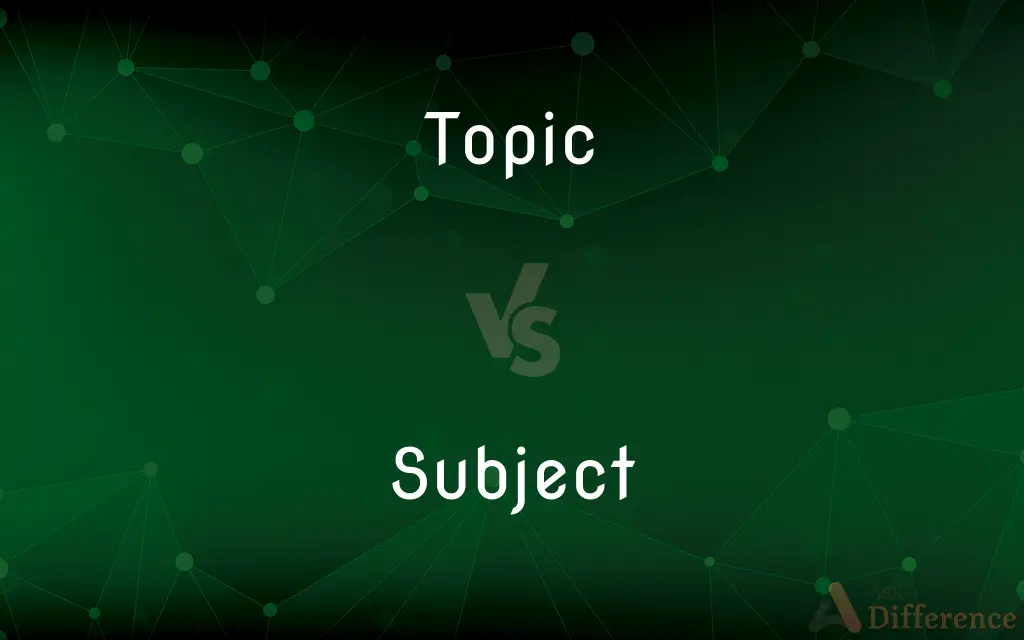Topic vs. Subject — What's the Difference?
By Tayyaba Rehman — Published on August 24, 2023
A topic is what's being discussed, while a subject is what the discussion is about.

Difference Between Topic and Subject
Table of Contents
ADVERTISEMENT
Key Differences
A topic is typically a specific area or portion of a broader subject matter. A subject, on the other hand, is a broader field of knowledge or study. It encompasses various topics within its domain.
In writing, a topic could be the central idea or theme that a writer addresses. It's often what catches a reader's interest. A subject, in the context of grammar, refers to the noun, pronoun, or noun phrase that performs the action of the verb. For example, in the sentence "The cat sat on the mat," "The cat" is the subject. While the topic of the sentence could be about where the cat is sitting.
Comparison Chart
Scope
Specific area or aspect
Broader field of knowledge or study
Usage
What's being discussed
What the discussion is about
Context
Central idea in writing
General theme or domain of study
ADVERTISEMENT
Grammar
Not a grammatical function
Performs the action of a verb in a sentence
Example
"Benefits of green tea"
Nutrition or Health
Compare with Definitions
Topic
A specific matter under discussion.
The topic of today's meeting is productivity.
Subject
A field of knowledge studied or taught.
Mathematics is my favorite subject.
Topic
A subject of conversation or discussion.
They quickly changed the topic when he entered the room.
Subject
A person or thing that undergoes study or analysis.
The test subject showed no reaction to the stimulus.
Topic
The subject or theme of a discourse or artistic composition.
The main topic of her song was heartbreak.
Subject
The main topic dealt with in a book or work.
The subject of her novel is love in the digital age.
Topic
A particular issue or concept.
Environmental pollution is a serious topic nowadays.
Subject
To cause to undergo; as, to subject a substance to a white heat; to subject a person to a rigid test.
Topic
Some situation or event that is thought about;
He kept drifting off the topic
He had been thinking about the subject for several years
It is a matter for the police
Subject
The person who is treated of; the hero of a piece; the chief character.
Writers of particular lives . . . are apt to be prejudiced in favor of their subject.
Topic
Topical.
Subject
Cause to experience or suffer or make liable or vulnerable to;
He subjected me to his awful poetry
The sergeant subjected the new recruits to many drills
People in Chernobyl were subjected to radiation
Topic
The subject matter of a conversation or discussion;
He didn't want to discuss that subject
It was a very sensitive topic
His letters were always on the theme of love
Subject
A thinking or feeling entity; the conscious mind; the ego, especially as opposed to anything external to the mind.
Topic
A branch of study related to a larger field.
Quantum mechanics is a complex topic in physics.
Subject
Likely or prone to be affected by (a particular condition or occurrence, typically an unwelcome or unpleasant one)
He was subject to bouts of manic depression
Topic
The subject of a speech, essay, thesis, or discourse.
Subject
Dependent or conditional upon
The proposed merger is subject to the approval of the shareholders
Topic
A subject of discussion or conversation.
Subject
One concerning which something is said or done; a person or thing being discussed or dealt with
A subject of gossip.
Topic
A subdivision of a theme, thesis, or outline.
Subject
A corpse intended for anatomical study and dissection.
Topic
(Linguistics) A word or phrase in a sentence, usually providing information from previous discourse or shared knowledge, that the rest of the sentence elaborates or comments on. Also called theme.
Subject
(Grammar) The noun, noun phrase, or pronoun in a sentence or clause that denotes the doer of the action or what is described by the predicate.
Topic
Topical
Subject
The mind or thinking part as distinguished from the object of thought.
Topic
Subject; theme; a category or general area of interest.
A society where a topic cannot be discussed, does not have free speech.
Stick to the topic
An interesting topic of conversation
Romance is a topic that frequently comes up in conversation
Subject
The essential nature or substance of something as distinguished from its attributes.
Topic
(Internet) Discussion thread.
Subject
(logic) That of which something is stated.
Topic
(music) A musical sign intended to suggest a particular style or genre.
Subject
To cause (someone or something) to undergo a particular experience, especially one that is unpleasant or unwanted.
I came here to buy souvenirs, not to be subjected to a tirade of abuse!
Topic
(obsolete) An argument or reason.
Subject
(transitive) To make subordinate or subservient; to subdue or enslave.
Topic
An external local application or remedy, such as a plaster, a blister, etc.
Subject
Placed under the power of another; specifically (International Law), owing allegiance to a particular sovereign or state; as, Jamaica is subject to Great Britain.
Esau was never subject to Jacob.
Topic
One of the various general forms of argument employed in probable as distinguished from demonstrative reasoning, - denominated by Aristotle to`poi (literally, places), as being the places or sources from which arguments may be derived, or to which they may be referred; also, a prepared form of argument, applicable to a great variety of cases, with a supply of which the ancient rhetoricians and orators provided themselves; a commonplace of argument or oratory.
These topics, or loci, were no other than general ideas applicable to a great many different subjects, which the orator was directed to consult.
In this question by [reason] I do not mean a distinct topic, but a transcendent that runs through all topics.
Subject
That which is subjected, or submitted to, any physical operation or process; specifically (Anat.), a dead body used for the purpose of dissection.
Topic
An argument or reason.
Contumacious persons, who are not to be fixed by any principles, whom no topics can work upon.
Subject
To bring under control, power, or dominion; to make subject; to subordinate; to subdue.
Firmness of mind that subjects every gratification of sense to the rule of right reason.
In one short view subjected to our eye,Gods, emperors, heroes, sages, beauties, lie.
He is the most subjected, the most nslaved, who is so in his understanding.
Topic
The subject of any distinct portion of a discourse, or argument, or literary composition; also, the general or main subject of the whole; a matter treated of; a subject, as of conversation or of thought; a matter; a point; a head.
Subject
To expose; to make obnoxious or liable; as, credulity subjects a person to impositions.
Topic
An external local application or remedy, as a plaster, a blister, etc.
Subject
To submit; to make accountable.
God is not bound to subject his ways of operation to the scrutiny of our thoughts.
Subject
To make subservient.
Subjected to his service angel wings.
Subject
Something (a person or object or scene) selected by an artist or photographer for graphic representation;
A moving picture of a train is more dramatic than a still picture of the same subject
Subject
A person who owes allegiance to that nation;
A monarch has a duty to his subjects
Subject
A person or thing that is being discussed, described, or dealt with
I've said all there is to be said on the subject
He's the subject of a major new biography
Subject
A branch of knowledge studied or taught in a school, college, or university
Maths is not my best subject
Subject
A member of a state other than its ruler, especially one owing allegiance to a monarch or other supreme ruler
The legislation is applicable only to British subjects
Subject
A noun or noun phrase functioning as one of the main components of a clause, being the element about which the rest of the clause is predicated.
Subject
Under the authority of
Ministers are subject to the laws of the land
Subject
Conditionally upon
Subject to the EC's agreement, we intend to set up an enterprise zone in the area
Subject
Cause or force someone or something to undergo (a particular experience or form of treatment, typically an unwelcome or unpleasant one)
He'd subjected her to a terrifying ordeal
Subject
Prone; disposed
A child who is subject to colds.
Subject
Likely to incur or receive; exposed
A directive subject to misinterpretation.
Subject
Contingent or dependent
A vacation subject to changing weather.
Subject
One who is under the rule of another or others, especially one who owes allegiance to a government or ruler.
Subject
Something that is treated or indicated in a work of art.
Subject
(Music) A theme of a composition, especially a fugue.
Subject
A course or area of study
Math is her best subject.
Subject
A basis for action; a cause.
Subject
One that experiences or is subjected to something
The subject of ridicule.
Subject
A person or animal that is the object of medical or scientific study
The experiment involved 12 subjects.
Subject
One who is under surveillance
The subject was observed leaving the scene of the murder.
Subject
(Logic) The term of a proposition about which something is affirmed or denied.
Subject
A being that undergoes personal conscious or unconscious experience of itself and of the world.
Subject
To cause to experience, undergo, or be acted upon
Suspects subjected to interrogation.
Rocks subjected to intense pressure.
Subject
To subjugate; subdue.
Subject
To submit to the authority of
Peoples that subjected themselves to the emperor.
Subject
Likely to be affected by or to experience something.
A country subject to extreme heat
Menu listings and prices are subject to change.
He's subject to sneezing fits.
Subject
Placed or situated under; lying below, or in a lower situation.
Subject
Placed under the power of another; owing allegiance to a particular sovereign or state.
Subject
(grammar) In a clause: the word or word group (usually a noun phrase) about whom the statement is made. In active clauses with verbs denoting an action, the subject and the actor are usually the same.
In the sentence ‘The cat ate the mouse’, ‘the cat’ is the subject, ‘the mouse’ being the object.
Subject
An actor; one who takes action.
The subjects and objects of power.
Subject
The main topic of a paper, work of art, discussion, field of study, etc.
Subject
A particular area of study.
Her favorite subject is physics.
Subject
A citizen in a monarchy.
I am a British subject.
Subject
A person ruled over by another, especially a monarch or state authority.
Subject
(music) The main theme or melody, especially in a fugue.
Subject
A human, animal or an inanimate object that is being examined, treated, analysed, etc.
Subject
(philosophy) A being that has subjective experiences, subjective consciousness, or a relationship with another entity.
Subject
(math) The variable in terms of which an expression is defined.
0, we have x
Subject
Placed or situated under; lying below, or in a lower situation.
Subject
Exposed; liable; prone; disposed; as, a country subject to extreme heat; men subject to temptation.
All human things are subject to decay.
Subject
Obedient; submissive.
Put them in mind to be subject to principalities.
Subject
That which is placed under the authority, dominion, control, or influence of something else.
Subject
Specifically: One who is under the authority of a ruler and is governed by his laws; one who owes allegiance to a sovereign or a sovereign state; as, a subject of Queen Victoria; a British subject; a subject of the United States.
Was never subject longed to be a king,As I do long and wish to be a subject.
The subject must obey his prince, because God commands it, human laws require it.
Subject
That which is brought under thought or examination; that which is taken up for discussion, or concerning which anything is said or done.
Make choice of a subject, beautiful and noble, which . . . shall afford an ample field of matter wherein to expatiate.
The unhappy subject of these quarrels.
Subject
That of which anything is affirmed or predicated; the theme of a proposition or discourse; that which is spoken of; as, the nominative case is the subject of the verb.
The subject of a proposition is that concerning which anything is affirmed or denied.
Subject
That in which any quality, attribute, or relation, whether spiritual or material, inheres, or to which any of these appertain; substance; substratum.
That which manifests its qualities - in other words, that in which the appearing causes inhere, that to which they belong - is called their subject or substance, or substratum.
Subject
The principal theme, or leading thought or phrase, on which a composition or a movement is based.
The earliest known form of subject is the ecclesiastical cantus firmus, or plain song.
Subject
The incident, scene, figure, group, etc., which it is the aim of the artist to represent.
Subject
The subject matter of a conversation or discussion;
He didn't want to discuss that subject
It was a very sensitive topic
His letters were always on the theme of love
Subject
Some situation or event that is thought about;
He kept drifting off the topic
He had been thinking about the subject for several years
It is a matter for the police
Subject
A branch of knowledge;
In what discipline is his doctorate?
Teachers should be well trained in their subject
Anthropology is the study of human beings
Subject
A person who is subjected to experimental or other observational procedures; someone who is an object of investigation;
The subjects for this investigation were selected randomly
The cases that we studied were drawn from two different communities
Subject
(grammar) one of the two main constituents of a sentence; the grammatical constituent about which something is predicated
Subject
(logic) the first term of a proposition
Subject
Make accountable for;
He did not want to subject himself to the judgments of his superiors
Subject
Make subservient; force to submit or subdue
Subject
Refer for judgment or consideration;
She submitted a proposal to the agency
Subject
Not exempt from tax;
The gift will be subject to taxation
Subject
Possibly accepting or permitting;
A passage capable of misinterpretation
Open to interpretation
An issue open to question
The time is fixed by the director and players and therefore subject to much variation
Subject
Being under the power or sovereignty of another or others;
Subject peoples
A dependent prince
Subject
Bring (a person or country) under one's control or jurisdiction, typically by using force
The city had been subjected to Macedonian rule
Subject
Being in a position or in circumstances that place one under the power or authority of another or others
Subject to the law.
Subject
Conditional upon something; used with to.
The local board sets local policy, subject to approval from the State Board.
Subject
In grammar, the entity performing the action in a sentence.
In the sentence Birds fly, Birds is the subject.
Subject
The main focus or center of attention.
The wedding was the subject of much gossip.
Common Curiosities
Is a topic always part of a subject?
Typically, yes. A topic is usually a specific area within a broader subject.
How is the word "subject" used in grammar?
In grammar, a subject is the noun, pronoun, or noun phrase that performs the action of the verb in a sentence.
What is the main distinction between a topic and a subject?
A topic is a specific matter under discussion, while a subject is a broader field or area it belongs to.
Do the terms "topic" and "subject" have the same meaning in all languages?
No, the exact nuances and applications of these terms can vary between languages.
Can a sentence have multiple topics?
Yes, a sentence or discussion can touch on multiple topics within a given subject or even across subjects.
How does one choose a good topic for a presentation?
It should be relevant, engaging, and appropriate for the audience, and it should ideally fall within the presenter's expertise or area of interest.
Can a topic and a subject be the same in a conversation?
Yes, in some contexts, the terms can be used interchangeably, but a topic is generally narrower.
In literature, can the subject and theme be different?
Yes, while the subject is what the literature is about (e.g., war), the theme is the underlying message or lesson (e.g., the futility of conflict).
Is the subject of a book its main theme?
Generally, the subject is the main topic or theme of the book, but it can have various topics discussed within.
Can a subject encompass multiple fields of study?
Yes, a subject like science can encompass multiple fields like biology, chemistry, and physics, each with its own topics.
Share Your Discovery

Previous Comparison
Numerator vs. Denominator
Next Comparison
Glass vs. CeramicAuthor Spotlight
Written by
Tayyaba RehmanTayyaba Rehman is a distinguished writer, currently serving as a primary contributor to askdifference.com. As a researcher in semantics and etymology, Tayyaba's passion for the complexity of languages and their distinctions has found a perfect home on the platform. Tayyaba delves into the intricacies of language, distinguishing between commonly confused words and phrases, thereby providing clarity for readers worldwide.













































